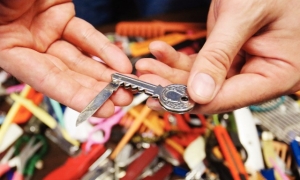Security tightens at county courthouse
By John Joyce
Published in News on October 12, 2015 1:46 PM

News-Argus/CASEY MOZINGO
Items like this key-knife, a potentially dangerous weapon, continue to turn up at the entry control points of the Wayne County Courthouse despite signs stating that weapons and sharp objects are not permitted. Sentry Security and the Wayne County Sheriff's Office are working together to improve safety at the courthouse.
Security at the Wayne County Courthouse has increased significantly over the last six months, largely at the request of Wayne County Sheriff Larry Pierce.
In addition to more deputies being assigned to the facility, upgrades in communication capabilities and stricter policies on what items are and are not allowed into the building have been added to improve safety.
"It is just something I feel like was sort of long overdue," Pierce said. "I feel like we needed to beef up our security due to the changing environment in our nation and in our county."
Pierce installed a new radio system for the bailiffs assigned to the upper halls and courtrooms. In the past, bailiffs working on the second, third and fourth floor had no quick way to communicate with each other and with security personnel on the first floor.
That has since changed.
Pierce had the bailiffs equipped with a state-of-the-art communications system that now lets them speak to each other instantaneously -- sometimes while court is in session.
"They've not had that before," he said.
The communications will not impact ongoing court proceedings, but will ensure a quick response if help is needed inside a courtroom.
"They have, I guess you will refer to them as Secret Service microphones and ear plugs, so they'll be able to talk to and hear each other if necessary," he said.
But better equipment is not the only change.
In the atrium, where non-county employees and non-law enforcement officers must enter through metal detectors, additional changes have been made.
Five new positions have been added over the last year, and a sheriff's deputy has been assigned to the atrium to work alongside the private security officers staffed by Sentry Security.
These unarmed security officers are responsible for minding the flow of foot traffic in and out of the courthouse and maintaining a safe and professional space for the public inside the courthouse.
They are also the first line of defense, company general manager Shaun Marso said.
"Our officers know that if someone gets a weapon passed them and someone gets killed, that's our fault. And they take that responsibility seriously," he said.
In the Sentry Security office located across the street from the courthouse, a box containing items confiscated at each of the two main entrances of the courthouse fills and is emptied every three to four weeks.
Items in the box include everything from finger nail clippers and scissors to Leatherman tools, pocket knives and butterfly knives.
"For the most part, what we're looking at is we want to follow TSA (Transportation Security Administration) guidelines," Marso said, holding up a plastic hair pick with metal tongs and a sharp pointed end. "Now some of this equipment here, it's common sense. This might not be illegal on a plane, but if you stab someone in the throat with this, we've got a problem."
He said the sheriff's intent is to protect his deputies and the people in court.
Most of the time, citizens who have items confiscated understand why. Often, if they have not already read the three visible signs posted along the route from the parking lot up to the courthouse entrance and at the metal detectors inside the doors, the security officers will tell people that if they have a knife or a gun on them to go back and secure them in their vehicles, Marso said.
Other times, as happened recently concerning a nail file, the person will try to say that the item belonged to a dear relative who recently died and it is the only item the person has left of their departed relative.
"And yet, five minutes later, after they've called me an (expletive) a couple of times, they couldn't care less about that item anymore," he said.
Sentry Security owner David Grice said that up north, most states allow counties to confiscate banned items and then sell them at auctions -- sending profits into the county coffers or to the local sheriff's office's general fund.
"In the northern states, anything that they seize that is not automatically illegal -- I mean for everybody -- they sell at public auction," Grice said. "They get knives, guns, whatever. They'll sell it at public auction to a licensed gun dealer or whoever, and all the money goes back to the county budget or the sheriff's office or wherever."
That money, accumulated monthly, could easily pay for a new patrol car or another deputy's salary, Grice said.
But in Wayne County, the confiscated items are inventoried, carted to the sheriff's office and disposed of through smelting.
Sentry Security Operations Manager Robert Osborne said there is a vast amount of time and money that could saved by his office and by the county if people would just think before bringing in items that -- innocent or otherwise -- could potentially be used as a weapon. The officer and the citizens would all be better off, he said.
"Just leave it your car. It's common sense. If you aren't going to need it while you're in there, leave it in your car," Osborne said.
